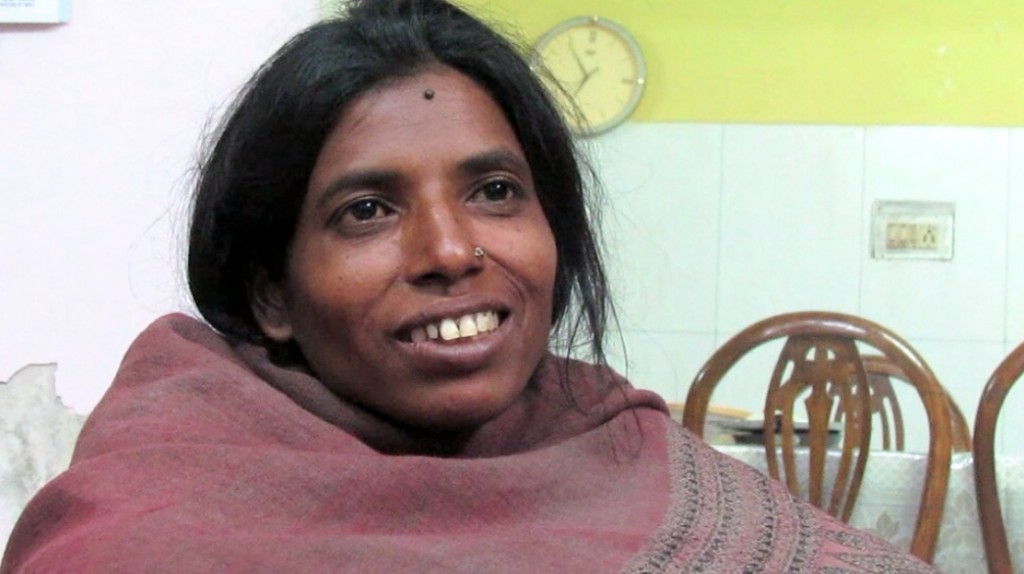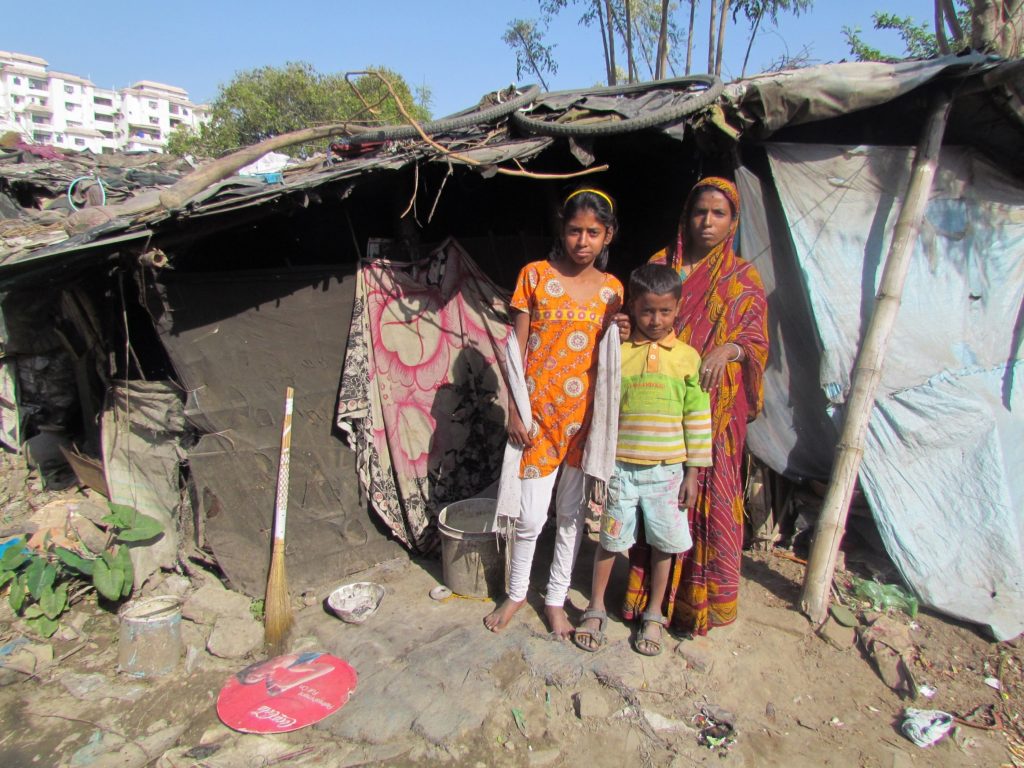This article is the first in a new series that follows the lives of four Assamese Muslim refugees currently living in a slum in the Rahimnagar section of Lucknow, India. Having fled religious persecution, three of the women make their living as domestic workers, and one works as a rag-picker. Vaidehi Joshi originally reported their stories in her short Urdu film entitled “Lucknow’s Refugees.”

I’m somewhere between dreaming and sleeping when I hear a knock on the door. It’s Wahid, the cook, who has a raspy voice but hard knuckles. He raps on the thin wooden frame a second time.
“Vaidehi-ji, a woman has come to meet you.”
It’s nearly seven in the evening, and the last colors of the Indian sun have long since been swallowed up by the black February sky. I rub the sleep off my face and gather my camera and tripod before making my way down the steep marble staircase to the front gate of the compound.
From the light of a nearby streetlamp, I make out the faint silhouette of two women. Next to a line of potted ferns by the front door of the house is my host mother, whom we fondly call Simi apa, or “older sister.” Sitting on a porch swing to her right is Zaheda. Her arm is wrapped firmly around a young boy — her son — who rests his head on her shoulder.
Until a few years ago, Zaheda worked as a maid in the compound that I have been living in for the past several months. When Simi apa heard that I planned to interview domestic workers in Lucknow, she offered to set up a meeting. She described Zaheda as a remarkable and confident woman who was incredibly bright, given that she never finished school.
But when I finally meet Zaheda, none of this is evident. Wrapped in a shawl, she seems smaller than I imagined. In the light of the drawing room, the weariness below her eyes is evident. When she sits with her arms wrapped around her knees, she tucks her face behind thin wrists. Her mind seems to be elsewhere, and she barely notices when the edge of her sari falls from her forehead and reveals previously covered hair.
As I set up my camera, I wonder whether she will want to open up to me. But as we begin talking, she soon forgets about the camera in front of her and ignores Wahid’s incessant chattering in the kitchen behind her. She looks directly into my eyes and, with a slight smile, starts to tell her story.
Zaheda was born in Guwahati, Assam, to a Muslim farming family. After her father’s death, her mother was left with very little land. Unable to afford to feed her four children, she decided to marry Zaheda off at the age of fifteen. Zaheda’s husband was significantly older than her and often abusive.
When her husband took another wife, Zaheda fled Assam, taking her seven-month-old daughter with her. She found refuge in Lucknow, the capital city of Uttar Pradesh, one of the largest, most populated and poorest states in India.
Zaheda is frank about the reality of her life. She tells me about the slum that she lives in, located in a small plot of land behind a petrol pump in the Rahimnagar district of the city. After running away to Lucknow, she found a job working as a maid in nearby neighborhoods.
Every day, she spends a couple hours in three different homes; she may wash dishes, cut vegetables, sweep and mop the floors, wash the laundry, and occasionally cook the family’s rotis. Depending on how much she works (and on her employer’s generosity), Zaheda earns anywhere from 200 to 700 rupees a month, per house. In American dollars, that’s between three to 12 bucks.

As a domestic worker, Zaheda has no job security and no rights of any kind. The challenges she faces on a daily basis — discrimination, abuse, and harassment — are more than some people face in a lifetime. She tells me of employers who threatened to fire her because she was working too fast, or who have refused to hand over her salary because they didn’t approve of her work, or who have yelled at her to get out of their house.
“We have to tolerate it,” Zaheda says. “If someone speaks rudely or angrily to you, then it’s best to bow your head and not speak. We don’t raise our heads and speak. We’re poor, you see. If we speak with our heads held high, they’ll throw us out and we’ll loose our jobs.” But Zaheda still maintains that most people are nice, and repeatedly tells me that the majority of employers have shown her kindness.
The more I listen, the more Zaheda wants to talk. Without me asking, she shares the story of her second marriage to a local Lucknowi man who, like her, was Muslim. Shortly after the birth of her son, her second husband stole her life savings, burned their marriage certificate, left Lucknow, abandoned his family and filed for divorce.
Her eyes well up with tears when she asks, “Why would he leave his two little kids? Women sacrifice everything for their men, but not so that they leave them.” She begins to cry while I try (unsuccessfully) to keep it together.
While Zaheda talks, her son comes and sits quietly beside me. He peers with wide eyes at the camera, and seems far more interested in watching his mother speak on the screen rather than watching her speak in front of him. When I ask her about her children, I see her face light up for the first time.
“My daughter wants to go to school,” she tells me. “She loves to learn. When she left school, she cried so much.” Zaheda’s children have been out of school for nearly six months. Despite working six or seven-day weeks, Zaheda simply cannot earn enough as a single working mother to pay their tuition.
She sends them to a local mosque, where they to learn to pray and read the Quran free of cost. “I tell my kids to learn Arabic, learn namaaz, and just pray. That’s the best we can do for now,” she says. At this remark, Zaheda’s son leaves my side and darts back to his mother. He clutches her arm and hides his head in her shawl.
By the time Zaheda leaves, the moon is just beginning to rise through the thick city smog. From the front gate, I can hear the sound of Wahid clattering steel plates onto the kitchen table. Zaheda takes her son’s hand and leads him down the dirt path to catch a shared autorickshaw back to Rahimnagar from the main road.
As I watch her slowly disappear into the darkness, Zaheda seems tiny and frail to me. But she was also every bit the woman Simi apa had described — the woman who, against all odds, strives to see the best in every situation; the woman who singlehandedly raises and provides for her family; a woman unafraid and determined to speak out.
Vaidehi Joshi is 23, and lives in Richmond, Virginia. She studied English at Barnard College in New York City and will be joining the movement to end educational inequity as a 2013 Teach for India fellow in Mumbai. You can see more of her work on her website or follow her on Twitter @vaidehijoshi.












